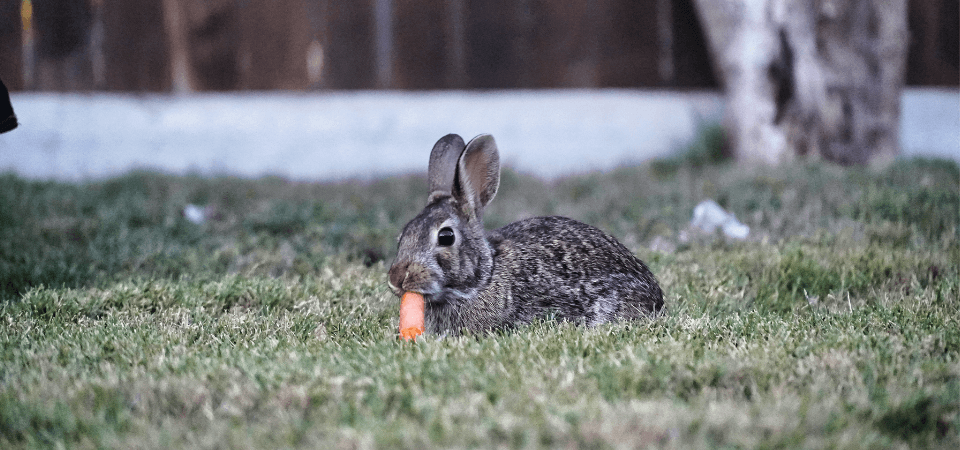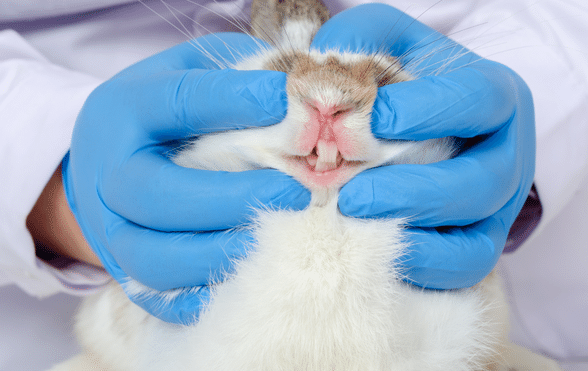Vet expert Dr. Sophie Bell looks into tackling dental problems in rabbits. She explores causes, the most common symptoms, the main preventative methods, diagnosis and treatment.
Is your rabbit insured? Get a quote for £2,000 of vet fee cover | Insure up to 3 pets per policy | We’ve been insuring exotic pets since 1996 | Check out our customer reviews on Feefo.
Tackling rabbit dental problems
With sixteen teeth on the top jaw and twelve on the bottom, those twenty-eight teeth can cause our rabbits a whole array of clinical signs and problems. Dental care is an especially important part of rabbit ownership and recognising problems promptly can minimise progression of the issue.
Rabbits have six incisor teeth. The four visible ones and two non-functional teeth that sit behind the front two incisors. These teeth are also called peg teeth and continually grow along with the other incisors.
Their back molars are used for grinding and sharp spurs can develop on these teeth, usually due to an incorrect diet or malocclusion.

Tackling rabbit dental issues
Possible symptoms of dental disease in rabbits
- Excessive drooling leading to a wet chin, chest and front legs
- Discharge from the eyes – clear and watery or thick and white
- Facial irritation
- Quidding – dropping or spitting out food
- Anorexia – this can progress to dangerous dehydration quickly
- Lethargy and depression
- Weight loss
- Swelling around the face/visible abscess
- Reluctance to groom
- Accumulation of faeces under the tail
- Less faeces or complete lack of them (if eating less/anorexic)
- Dry faeces if becoming dehydrated
- Pain – you should use the rabbit grimace scale which looks at facial expression
- Bruxism – tooth grinding due to pain
- Halitosis (bad breath)
- Changes in behaviour i.e., aggression due to pain
What can increase the risk of dental disease in rabbits?
Incorrect diet
Diet plays a huge role in rabbit health and well-being. Although occasional treats like strawberries are okay, regular feeding would cause weight gain due to the high sugar content. Soft fruits also offer no benefit in wearing down a rabbit’s continually growing teeth.
Roughage is the most important part of your rabbits diet and is vital for good gut function, bacteria and wearing down teeth.
The diet should consist mainly of high-fibre, dust free hay. This will ensure plenty of chewing to keep those teeth short.
Keep pellets (if you feed them) to a minimal amount, but do offer safe herbs and fresh leafy greens, a good-sized handful per day such as mint and broccoli.
Variety is important but offering a new food type should be done gradually. Fruits and sugary vegetables such as carrots should be rare treats only.
As diet plays an important role in preventing dental problems, read our rabbit diet article here.
Lack of safe chew toys
Investing in safe wood blocks and chew toys encourages chewing, biting and tooth wear. There are plenty of products available. One DIY option is to use toilet roll tubes and cardboard boxes. Hiding treats or hay inside can also help with boredom.
If using a box, ensure you remove any tape or staples and that they’re not made of glossy cardboard, or have ink or writing on them.
Ensure they are chewing, and shredding only and not consuming large amounts. It is okay for them to swallow a little, but a large amount could lead to digestive problems. Read more about chewing here.
Cardboard boxes are great for scared or anxious rabbits to hide in. Make sure they can get in and out easily and are well ventilated.
Adding shredded paper, pet friendly soil and wood can turn your cardboard box into a digging box, great for expressing normal behaviour and reducing boredom.
Malocclusion
Malocclusion means the teeth are incorrectly positioned and unable to wear down as they fail to meet.
As rabbit owners, you will only be able to see the incisor teeth clearly, the back teeth (molars) will need to be checked by your vet and should be assessed at least twice yearly, or more often if there is an underlying problem such as malocclusion. You can find a vet here.
Overgrown molars can affect the incisors as it makes it difficult for the rabbit to close their jaw completely resulting in less incisor wear.
The problem can cause sores and inflammation to the tongue, cheeks and gums and lead to the symptoms listed. Malpositioned and/or overgrown incisors also affect overall wear of the cheek teeth.
Trauma can be a cause of malocclusion, but most cases are hereditary and seen before six months of age. Regular veterinary dental checks will be required and paying close attention to any new physical or behavioural signs is vital. These bunnies usually require regular dental work under general anaesthetic.
How to check your rabbits’ teeth
Part of keeping rabbits as pets should involve a weekly check of the incisor teeth and a daily check on their overall health.
Have your rabbit sat in a comfortable position, facing you.
Using your fingers part their lips to create a smile. This will allow you to take a good look at the position of the incisors and the colour of the gums. These should be salmon pink.
You can use your finger to feel for any sharp edges or wobbly teeth.
Your vet will use an otoscope to check the back teeth, but a thorough examination is usually done under sedation or general anaesthetic especially if a problem is suspected.
Treatment options for dental problems
Molars: Problems effecting the molars will require a sedation or general anaesthetic to treat. Teeth will be filed down, removing all sharp edges and spurs.
Any broken or diseased teeth will be removed, and your rabbit is likely to be able to go home the same day.
If the problem is severe, they may require a hospital stay to ensure they are eating and receiving regular pain relief.
In general, removing the painful spurs will improve well-being and comfort quickly.
Incisors: Overgrown incisors are often cut down whilst the rabbit is conscious depending on the problem and how well the bunny can tolerate it. On the rare occasions incisor teeth need removing, this will be carried out under general anaesthetic.
Once home make sure you correct the diet and provide plenty of safe items to chew on. Perform regular checks of the incisors, note any changes, and visit the vet if you feel your rabbit is showing any signs of pain or illness. The quicker the problem is addressed, the faster they will get back to their normal self.
Is your rabbit insured? Get a quote for £2,000 of vet fee cover | Insure up to 3 pets per policy | We’ve been insuring exotic pets since 1996 | Check out our customer reviews on Feefo.

